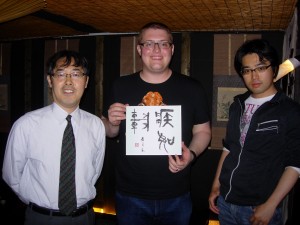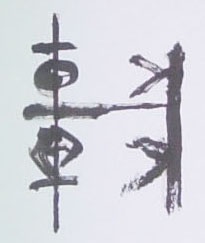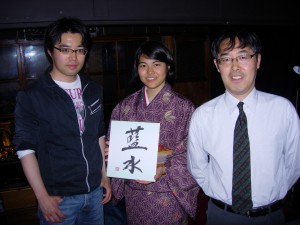2015年5月9日(土)、京都烏丸御池の「Samurai Cafe & Bar SHISHIN(士心)」にて字天ナイトを開催いたしました。
当日のライブの、活動報告です。
今回の字天ナイトもまた書家の八木翠月先生にご臨席いただき、小田の「新ことば」を即興で書にしたためていただきました。
今回「新ことば」をお送りしたのはSan Franciscoから来られたJason Carrさん、および士心の新スタッフの松永倫子さんです。
本文は、お二人にお送りしたレターに従って、英語および日本語で掲載いたします。
まず、Jason Carrさんへの新ことば「疾如車(はやきことくるまのごとし、Hayaki koto kuruma no gotoshi)」です。
—————————

I chose these kanji characters for you according to your first and family name.

Please see this character.
I asked Calligrapher Yagi Suigetsu to write kanji in archaic style.
This reads “kuruma (車, くるま)”, whose meaning is “car, vehicle, chariot / wheel”.
Modern-styled kanji “車” is its simplified form.
About 3,000 years ago Chinese civilization used chariots in war fields.
They were similar as ancient western chariots, horses in line carrying carts with two wheels.
The archaic-styled “車” represents a cart, whose right side is a yoke and left side is two wheels.
As you might know, kanji is the sole modern survivor of ancient ideograms such as ancient Egyptian hieroglyphs or ancient Mayan characters.
Kanji “車” is used in modern usage for not only ancient chariot, but also any vehicles – 自転車 (jitensha) means a bike, 電車 (densha) means an electric train, and 車 (kuruma) itself means an automobile car.
So I chose this kanji for your family name “Carr”.
Next, the total meaning of three characters.
“疾如車” is derived from an ancient classic book called “Sonshi (孫子)”.
疾如風。徐如林。侵掠如火。不動如山。(Classical Chinese)疾きこと風の如し。徐かなること林の如し。侵掠すること火の如し。動かざること山の如し。(Japanese transcription)
Get speedy like a wind. Keep quiet like a forest. Conquer like a fire. Don’t move like mountains. (English Translation)
This is one of famous phrases in “Sonshi”.
“Sonshi” explains the art of wars, whose influence has been very much in both China and Japan.
Famous Japanese warlord Takeda Shingen (武田信玄) loved this phrase and wrote it in flags of his legions.
Even western Napoleon Bonaparte is said to have got interested in this book.
The above phrase means how to direct your legions, in some situations you need to stand still and not to move, and in other situations you need to move fast and fight aggressively.
Words of “Sonshi” are simple but have fruitful instructions, whose strategic thinking can be also applied to businesses and other activities.
Your first name “Jason” should be taken from a Greek mythological hero, who sailed seas with his comrades and fought fights.
So I took a phrase from “Sonshi” and modified it.
“疾如車” reads “Hayaki koto kuruma no gotoshi” in Japanese. It means “Get speedy like a car”.
“疾” means “be speedy”.
“如” is a preposition whose meaning is “like”.
And “車” means “car”.
All of them are written in an ancient style that can go back to three thousand years ago.
続いて、松永倫子さんへの新ことば「藍水(らんすい)」です。

倫子さんの故郷である静岡市の青い海のイメージと、教育学を専攻なさっていて子供たちが成長するところを見るのが好きである、というお話を伺って、古典から清清しい字を選ばせていただきました。
出典は、古代中国の古典である『荀子』です。
君たちは、こうあってほしい―「学ぶことは、継続しなければいけない。青の染料は、藍の草から採取するものだ。だがその色は、元の草よりも青いではないか。氷は、水から形成される。だがその冷たさは、元の水よりも冷たいではないか。」(君たちもまた、学び続ければますますよい人間となるのだ。努力を怠ってはならない。)
これは、『荀子』の開頭の言葉を、私が現代語訳したものです。ここから、「青は藍(あい)より出(いで)て、藍より青し」という故事成語が生まれました。そのこころは、人というものは努力することによって元の状態から脱皮してどんどんよくなっていくものだ、それは青の染料が藍の草から採取するが、元の草よりも青くなっていることと同じなのだ、というものです。
この『荀子』の言葉から二字を取って、清清しい組み合わせの「藍水」という言葉を作りました。そしてその言葉の背景には、学んで成長していくことの大事さをこめさせていただきました。
もしこの言葉のより深い内容にご興味をお持ちでございましたら、私の『荀子』読書サイトをご紹介いたします。ここで、この古典を少しずつ読むサイト作りを今年の春から始めています。とりわけその冒頭の勧学篇は名文であると、私は思うところです。
http://sorai.s502.xrea.com/website/xunzi/
では、また士心でお会いしましょう。
「新ことば」Live字天ナイト at Samurai Cafe & Bar SHISHINは、来月も開催する予定です。
またとない体験を、皆さんもどうかお試しください。初見の方、大歓迎です!
No comments yet. You should be kind and add one!
Our apologies, you must be logged in to post a comment.